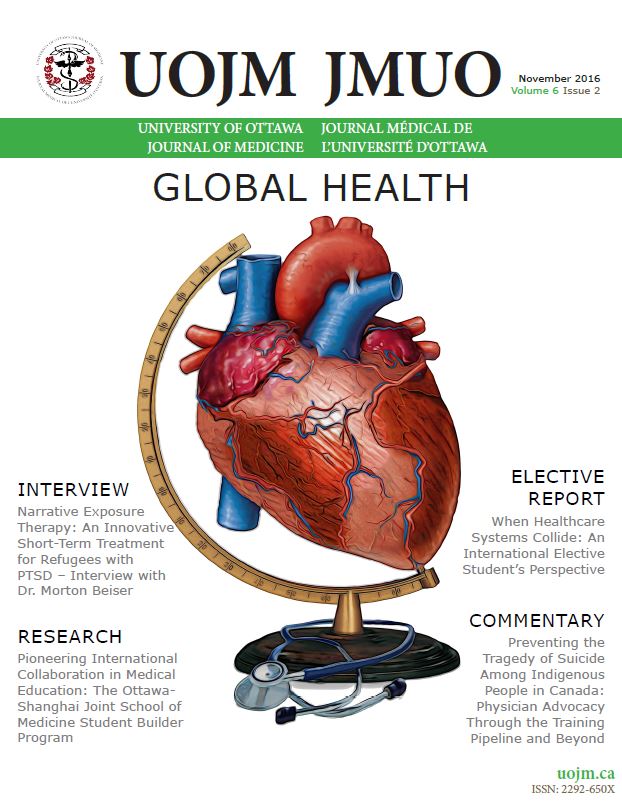Strategies for Improving the International Elective Process: SWOT Analysis of an Elective in Butare, Rwanda
DOI:
https://doi.org/10.18192/uojm.v6i2.1813Keywords:
SWOT, elective, developing countryAbstract
ABSTRACT
Background: Medical electives in developing countries present challenges in their planning and execution. We are two University of Ottawa Medical School students who recently completed a 3-week pre-clerkship elective in Butare, Rwanda and have insight into the elective planning process.
Methods: A Strengths, Weaknesses, Opportunities, and Threats (SWOT) analysis was conducted to evaluate the elective process for areas of improvement. “Internal factors” were defined as those pertaining to the University of Ottawa and us as the elective students. “External factors” were defined as those pertaining to Butare and Rwanda, including the teaching and administration staff, and the hospital itself.
SWOT Analysis: The main strengths of the elective program at the University of Ottawa was its ability to support students in the choice of elective, training, and funding, while the weaknesses involved communication between faculties and students. The opportunities for students included excellent learning opportunities and exposure to novel medical settings, while the threats involved clinical, administrative, and cultural factors.
Conclusion: We present a proposed template of an “elective hand-off” document for students to complete after returning from their elective. This document addresses the significant lack of longitudinal communication between students and presents a more detailed summary of the opportunities and threats associated with a given placement. We also propose mandated email contact between the elective student and the home faculty as well as between home and foreign faculties.
RÉSUMÉ
Contexte: Les stages au choix en médecine dans les pays en développement comportent des défis d’organisation et d’exécution. Nous sommes deux étudiants à l’école de médecine de l’Université d’Ottawa ayant récemment complété un stage au choix au préexternat de trois semaines à Butare, au Rwanda, et avons ainsi une vue d’ensemble du processus de planification de stages au choix.
Méthodes: Une analyse des forces, faiblesses, possibilités et menaces (SWOT, de l’anglais) a été menée pour évaluer les éléments des stages au choix pouvant bénéficier d’améliorations. Les « facteurs internes » étaient définis comme ceux étant reliés à l’Université d’Ottawa et à nous, les étudiants participant au stage. Les « facteurs externes » étaient définis comme ceux étant reliés à Butare et au Rwanda, incluant les personnels enseignant et administratif, et l’hôpital lui-même.
Analyse SWOT: La force principale du programme de stages au choix de l’Université d’Ottawa était sa capacité de soutenir les étudiants dans leur sélection de stages, leur formation et leur financement, alors que sa faiblesse était dans la communication entre les facultés et les étudiants. Les possibilités pour les étudiants incluaient d’excellentes opportunités d’apprentissage et l’exposition à de nouveaux milieux médicaux, tandis que les menaces comprenaient des facteurs cliniques, administratifs et culturels.
Conclusion: Nous proposons un gabarit pour l’évaluation des stages au choix, à compléter par les étudiants lorsqu’ils reviennent de leur stage. Ce document aborde le problème que représente le manque considérable de communication longitudinale entre les étudiants, et offre un résumé plus détaillé des possibilités et des menaces propres à un placement précis. Nous proposons également une communication par courriel obligatoire entre l’étudiant faisant un stage et sa faculté, ainsi qu’entre la faculté de l’étudiant et les autres facultés de médecine.
References
2. Marques JF. How politically correct is political correctness?: A SWOT analysis of this phenomenon. Business and Society. 2009;48(2): 257-78.
3. Panagiotou G. Bringing SWOT into focus. Business Strategy Review. 2003;24(2): 8-16.
Downloads
Published
Issue
Section
License
- Authors publishing in the UOJM retain copyright of their articles, including all the drafts and the final published version in the journal.
- While UOJM does not retain any rights to the articles submitted, by agreeing to publish in UOJM, authors are granting the journal right of first publication and distribution rights of their articles.
- Authors are free to submit their works to other publications, including journals, institutional repositories or books, with an acknowledgment of its initial publication in UOJM.
- Copies of UOJM are distributed both in print and online, and all materials will be publicly available online. The journal holds no legal responsibility as to how these materials will be used by the public.
- Please ensure that all authors, co-authors and investigators have read and agree to these terms.
- Works are licensed under a Creative Commons Attribution-NonCommercial-NoDerivatives 4.0 International License.


